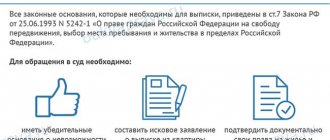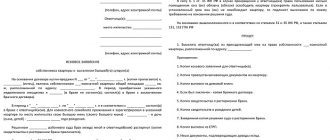Home / Real estate / Housing rights / Registration
Back
Published: December 24, 2019
Reading time: 6 min
3
16261
There is a list of citizens who have so-called “eternal” registration. This means the right to live indefinitely in an apartment, from which such a right holder cannot be evicted under any pretext if he does not agree to it. At the same time, the Housing Legislation also identifies other categories of persons who cannot be evicted from the premises under certain circumstances.
- Those who refused their shares during privatization
- Minor citizens
- Children left without parental care
- Marriage contract with the condition of maintaining the right of residence
- Other cases
- Is it possible to evict a person from an apartment if he has no other housing?
- Who cannot be evicted from a service apartment
Legislation on living on someone else's property
In accordance with the Housing Code, the right to live on someone else’s square meters arises not as a result of registration, but as a result of the relationship between the tenant and the owner of the property. Of course, registration plays a huge role, because it is it that confirms the consent of the owner of the premises to the housing of another citizen.
Of course, having registered a tenant in the house on a permanent basis - no matter whether he is a relative or not - he will automatically be recognized as a relative of the owner, and this will entail certain legal consequences.
All controversial situations during temporary registration and ways to solve problems
In the event that a citizen lives in a house without registration, and only with the consent of the owner, he will still be considered a family member, which means that it will not be so easy to evict him.
Relative by descent
Unlike spouses or daughters-in-law, relatives by descent cannot lose their status as family members. And this significantly complicates the procedure for their discharge.
Thus, according to the current legislation, close blood relatives (such as children and parents; grandparents and grandchildren; brothers and sisters - both full (having two common parents) and half) receive the right to reside and use housing by virtue of only one cohabitation with the owner of the residential premises.
If close relatives are registered in the apartment together with the owner, when trying to evict them, they can prove the existence of a relationship in court. And this, in most cases, will lead to the court siding with the relatives and refusing to evict. In order to deregister such citizens, you will need to prove that they voluntarily moved out of the apartment and do not plan to move into it again. Therefore, it is necessary to be extremely careful when registering blood relatives in residential premises.
Minors - is it possible to discharge children from an apartment or house by court?
The rights of citizens under 18 years of age in Russia are protected in a special manner by the guardianship and trusteeship authorities, law enforcement agencies and the court.
Evicting children from any form of property without the consent of these authorities is often impossible or difficult.
- Firstly, the child will have to find a new home where he will be registered.
- Secondly, the consent of the guardianship authorities is required.
- Thirdly, a citizen can go to court and demand eviction if all the conditions were met, but it was not possible to obtain consent from the guardianship.
Please note that the child can be registered at the place of residence of the father or at the place of residence of the mother. For example, if the spouses divorced while living in the father’s home, and he went to court to evict his ex-wife and children, then his claim may be partially satisfied.
That is, the spouse will be discharged, but the children will not, since they are not former.
We will pay special attention to municipal housing. If the parents lived in an apartment with their children under a social tenancy agreement , then no one will be able to discharge the children, not even the court.
An exception may be the fact of fictitious or formal registration established by the court without moving in a minor. But sometimes the court does not pay attention to these circumstances.
As a rule, to discharge a child from public housing, you will need the consent of both parents and the consent of the guardianship authorities. However, if the parents do not give it, the child will be discharged from the state apartment upon reaching 18 years of age.
“Eternal” registration: who cannot be discharged from the apartment under any pretext without his consent
There is a list of citizens who have so-called “eternal” registration. This means the right to live indefinitely in an apartment, from which such a right holder cannot be evicted under any pretext if he does not agree to it. At the same time, the Housing Legislation also identifies other categories of persons who cannot be evicted from the premises under certain circumstances.
Those who refused their shares during privatization
It is generally accepted that citizens who renounce their share in privatization acquire the right of indefinite residence. This is due to Art. 19 Federal Law No. 189 of December 29, 2004, which states that former members of the owner’s family do not lose the right to use residential premises.
It is possible to evict such a citizen, but only with his consent (if he voluntarily leaves). At the same time, for a pure purchase and sale transaction, the objector must confirm not only the fact of termination of registration, but also the fact of registration at another place of residence.
According to the Supreme Court, in the case of registration or permanent residence at another place of residence, refuseniks lose the right to indefinite residence.
Minor citizens
Until the age of 14, a citizen lives at the place of registration of his parents (Article 20 of the Civil Code of the Russian Federation). Until this moment, it is impossible to evict or register a child in a separate apartment, and after that - with the written consent of the legal representatives and only under the guardianship of the closest relatives. The exception is cases where a 14-year-old is recognized as partially competent due to marriage.
Among other things, a child under 18 years of age can be discharged in two cases:
parents moving with their child due to improved living conditions;
fictitious registration at the current place of residence.
The latter condition is often recognized by the courts as insufficient for eviction. Thus, it is impossible to discharge a 14-year-old without providing him with a separate apartment. Until this age, he can only live with his parents.
If we are talking about minor relatives, for example, a nephew, then registration can be terminated in the case where the citizen was not moved in by the owner of the apartment as a family member.
Children left without parental care
Guardians do not have the right to worsen the living conditions of minors living with them (Part 4 of Article 292 of the Civil Code of the Russian Federation). In this case, eviction is possible only with the consent of the guardianship and trusteeship authorities. But there must be good reasons for this, for example, moving to another apartment. At the same time, confirmation is provided that the new place of residence provides better living conditions.
Marriage contract with the condition of maintaining the right of residence Marriage contract with the condition of maintaining the right of residence If the marriage contract, which is certified by a notary in the manner prescribed by law, indicates the right to use residential premises, then no one can evict the person who has such a right. It does not matter whether it is the owner or not. The agreement must provide for:
the condition that registration ceases after divorce;
deadlines for termination of registration after divorce.
It is important to note here that in this case the norms of the law are observed (Part 4 of Article 31 of the Housing Code of the Russian Federation), but in judicial practice there are decisions not in favor of the owner of the premises.
The courts justify this by the fact that if the defendant does not have the right to use another property, it is simply inhumane to evict him onto the street. However, this contradicts the law and is disputed by the Supreme Court of the Russian Federation.
If the marriage contract establishes that in the event of termination of the marriage, the spouse who is not the owner of the premises retains the right to use it, he can be evicted from the apartment only by mutual agreement. Other cases There are other categories of persons whom no one has the right to evict.
Among them:
mistakenly recognized as missing - if the missing person shows up and declares his claims to the apartment, the court may rule on preserving his right to live indefinitely or use the premises for a certain period;
dependents or other persons who are supported by the owner and live together with him;
persons in whose favor a testamentary refusal is executed - if a living space under a will is transferred into the ownership of one person while retaining the right of use by another person, then the latter cannot be evicted (for example, when transferring property to children, but retaining the right of residence for the spouse).
The rights to use the premises by the listed persons can be challenged in court, provided that they are the owners of another property or have the right to reside in it.
Is it possible to evict a person from an apartment if he has no other housing?
Both property owners and tenants of municipal apartments can be evicted from an apartment if there is no other housing. In the latter case, it is assumed that proportionate square meters will be provided, but not always (Article 84 of the RF Housing Code).
There are several grounds for termination of a social tenancy agreement followed by eviction:
debt for utility bills and major repairs;
violation of the rules of public order and the interests of neighbors;
illegal redevelopment that poses a threat to life and health;
emergency condition of the house subject to demolition;
transfer of premises to non-residential stock or transfer to the benefit of the state;
non-compliance of the area with housing standards; use of the premises for other than its intended purpose.
If the tenant fails to comply with the instructions to eliminate violations, they may be evicted even without the provision of other premises.
But the owners of privatized housing are evicted only for very compelling reasons, which the court considers sufficient (Article 446 of the Code of Civil Procedure of the Russian Federation). These include debt on mortgage payments, since the actual resident is not the owner of the premises.
Who cannot be evicted from a service apartment
It is impossible to evict from the office premises the categories of persons, as well as members of their families, who are listed in Part 2 of Art. 103 Housing Code of the Russian Federation. However, if they are provided with another apartment or dormitory, they lose this right.
You cannot evict:
family members of military personnel, officials, employees of the Department of Internal Affairs and the FSB, customs, fire service, drug control authorities, if they died or disappeared while on duty;
pensioners who retired due to reaching the age limit;
family members of an employee who was provided with office space but who died;
disabled people of groups I and II, if the disability occurred due to the fault of the employer, as a result of an occupational injury, concussion;
family of a military personnel that includes children with disabilities or childhood disabilities.
Thus, some categories of citizens have the right to use residential premises and can lose it only at their own request.
However, the law provides for conditions in which their eviction is possible on other grounds. In this case, the availability of other housing and the age of the resident must be taken into account.
What is the likelihood of your ex-spouse or parents being evicted from your home?
A spouse cannot be evicted from a home for several reasons:
- The spouse is a first-degree relative of the owner of the residential premises.
- The right to live in a house is specified in the marriage contract concluded between the spouses.
To evict, it is necessary to dissolve the marital union and the contract, if any. Otherwise, the court will side with the spouse. But if the spouse becomes an ex, then the court will no longer help.
What should a resident do if they are illegally evicted from their apartment?
After eviction, the spouses will be able to resolve the issue of ownership of property if it was acquired during marriage.
Please note that the court may order a stay of eviction of the ex-spouse.
This is possible if the ex-spouse has no other property, and he cannot soon move, register in a new living space, and also if he does not have sufficient income to rent an apartment or room.
As for parents, they are never ex-parents. They can use the territory if the owner is their son or daughter.
As a rule, to evict older people . The court will be on the side of the pensioner or disabled person - as a rule, the dispute ends in their favor.
Who cannot be discharged
The law obliges all citizens to have a mandatory registration. The registration stamp is affixed to the person’s passport. And in case of receiving temporary registration, a temporary certificate is provided. The owner of the apartment cannot just write out:
- A stranger or distant relative who is registered with him with a minor child . In this case, the rights of the child are protected. If a parent is registered at a specific address, he has the right to register his children with him. And for this he does not need consent from the owner of the property. In the future, such a child can be forcibly discharged only if he has another home where he can live freely. Such housing may belong to him personally or to one of his parents. But if it is not possible to discharge the child to another address, the court will not allow this to be done forcibly. And since children should not live separately from their parents, it will also not be possible to expel an adult parent from the apartment. This protection of rights is valid until the child reaches the age of majority.
- Your child . You cannot check your baby out of the apartment on your own unless you register with him at a different address. Or if the second parent does not want to register him in his apartment. When parents divorce, they independently or through the court determine which of them the baby will live with. And in accordance with this, the baby is registered. If the mother, with whom the child is actually supposed to live, does not have rights to use housing, then the child will be registered at the father’s residential address.
- Relative . It is important to understand here that a spouse is considered a relative only if they are married. After a divorce, the right to reside in this apartment is lost if the spouse does not have rights to joint ownership in this property. And other relatives, such as brothers, sisters, parents, grandparents, cannot lose their status as blood relatives, since it is not determined by the presence of marriage. And it is impossible to cancel it. Therefore, registered relatives cannot be discharged from the apartment only at will.
- A disabled relative, including a former spouse . If he has a certain disability group, or has reached retirement age, such a person is considered disabled. Therefore, the state stands up to protect such citizens. And if they do not have another property where they can live freely, it will not be possible to evict them against their will. In addition, the relative himself may be required to pay alimony or support a disabled dependent.
- The man who refused privatization . Previously, all real estate was recognized as state property. Therefore, if you live in an apartment that has been privatized, then you need to take into account some factors. Every Russian has had and has the right to participate in privatization as an adult. But there are people who, for certain circumstances, refused to exercise this right. Therefore, they abandoned it while other family members could privatize this apartment. From this moment on, this person received the right to live in this property for life, regardless of who will be the owner of this property. Until he leaves the apartment of his own free will, or dies, he cannot be discharged. Even if the owners of the property change several times, this person has the full right to use the apartment.
Thus, registering other citizens in your apartment may not be as safe a procedure for the owner as many people think. You can learn more about this in the presented video.
Other relatives and dependents settled as family members
Other relatives who have registration in a foreign territory have the right to live there.
However, registration only proves the owner’s consent to register a relative in the house or apartment. And in order to evict, you will need to confirm the relative’s status not as a permanent resident, but as a lodger.
It will not be possible to evict a registered relative if he:
- He lived in the apartment for a long time.
- He ran a common household together with the owner of the home.
- Had general expenses.
- Has written consent to move in.
Why can the owner be evicted from the apartment?
Relatives moved into the house as family members may include grandparents, brothers/sisters, uncles/aunts, and nephews.
If the person subject to eviction is on alimony support or dependent on the owner of the premises, then eviction will be possible only with a decision of the judicial authorities. It will be taken into account that alimony obligations and obligations to support dependents must be terminated.
Dependents include: grandparents, disabled brothers or sisters.
Tenants with an agreement - why might the court not discharge them?
Citizens renting housing, even through the judicial authorities, will not be able to be discharged in the following cases:
- A short-term lease agreement was concluded, allowing tenants to use the housing for 1 year - and this period has not yet passed.
- A long-term lease agreement was concluded with the tenants, providing for the right to use housing for 5 years - and if this period has not yet passed.
- The homeowner decided to terminate the contract illegally. For example, he did not notify the tenants that he wished to terminate the contract with the tenants and would not renew it, although the notice must be received in writing 3 months before the expiration of the contract.
- The tenants of the residential premises fully fulfilled all obligations stipulated by the contract, but the owner proves the opposite in court. For example, the owner states that the tenants do not pay rent on time, destroy and damage the housing, and use it for other purposes. If there is no evidence, those renting residential premises will be able to live in it until the contract is automatically terminated.
It will not be possible to evict tenants without a court decision under the current lease agreement.
Exceptions in which eviction will be possible must be the cases and conditions specified in the lease agreement. If they are not, then the court will be on the side of the employers.
In addition, in some cases, the court may delay the time of eviction of tenants and give them time to correct themselves - for example, if they were disturbing their neighbors. This rule will only apply to long-term lease agreements .
Other cases when citizens cannot be evicted
Eviction, or automatic restoration of property rights, will also be possible under the following circumstances:
- If a registered citizen was considered missing. His rights can be restored through the courts.
- If the right to live in the premises was stated in the will.
- If the right of residence is fixed in the gift agreement, the donor can live in the apartment or house as long as he wishes.
- If a citizen who voluntarily refused privatization decides to restore his property rights to housing.
- Orphans or children left without parental care. It will be impossible to discharge them from their housing without the consent of the guardianship authorities. There must be proof that the child is being moved to better conditions, otherwise he will not be discharged or evicted.
It can be concluded that the eviction process is not so simple. It is necessary to collect evidence and prepare documents so that the court is on the side of the owner.
In addition, all regulations and conditions for eviction prescribed in them should be taken into account. If you have any questions, feel free to ask our lawyers. Consultation is free.








